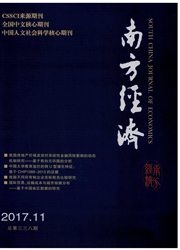

 中文摘要:
中文摘要:
本文利用1978—2008年间我国30个省市区的面板数据,对改革开放以来我国粮食生产进行了随机前沿分析。以此为基础,对我国粮食生产技术效率进行了影响因素分析,并对粮食生产全要素生产率增长进行分解和趋势分析。结果表明,农业基础设施建设和制度因素是影响我国粮食生产技术效率的关键因素;我国粮食产量增长主要是由投入要素的增长拉动,31年间全要素生产率的平均增长率为1.17%,TFP对我国粮食产量的贡献很小,其原因在于技术进步与技术效率变化呈现相反趋势。2004年以来,技术效率提高的速度持续下降,技术进步逐渐成为TFP增长的主要动力。
 英文摘要:
英文摘要:
In the paper the stochastic frontier analysis is applied to study the food production in China by using the panel data of the 30 provinces during 1978 - 2008. Based on the results of the analysis, we conduct a factor - analysis on the technical efficiency in food production, and a decomposition of the total factor productivity growth. The trend of the components in TFP growth is analyzed. The results show that the infrastructure and institutions in agriculture are two key factors affecting the technical efficiency of food production. Food output growth is mainly enhanced by the growth of the inputs while the TFP contributes little to the growth. The average of TFP growth is only 1.17%. The reason is that the growth in technical progress and that in technical efficiency move in the opposite direction. The velocity of TE growth has been decreasing gradually since 2004 while technical progress becomes a key momentum of TFP growth.
 关于周先波:
关于周先波:
 同期刊论文项目
同期刊论文项目
 同项目期刊论文
同项目期刊论文
 A Comparative Study on the Health Care and Medical Service Consumption of Urban and Rural Households
A Comparative Study on the Health Care and Medical Service Consumption of Urban and Rural Households Investment Management and Financial Innovations: Causality between openness and indigenous factors a
Investment Management and Financial Innovations: Causality between openness and indigenous factors a 期刊信息
期刊信息
